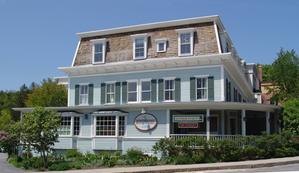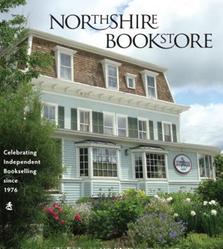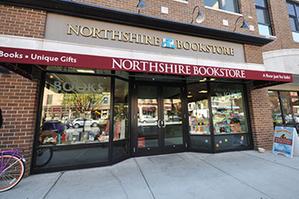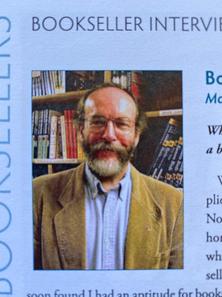 I'm not a "wide range of emotions" kind of guy, but when news broke last week that the Northshire Bookstore in Manchester Center, Vt. and Saratoga Springs, N.Y., would have new owners, I'll confess to having had a semi-wide range of emotions in response. The primary one, however, was gratitude. The Northshire had literally served as my portal into another world, where I learned how to be a bookseller. This was life-altering on so many levels.
I'm not a "wide range of emotions" kind of guy, but when news broke last week that the Northshire Bookstore in Manchester Center, Vt. and Saratoga Springs, N.Y., would have new owners, I'll confess to having had a semi-wide range of emotions in response. The primary one, however, was gratitude. The Northshire had literally served as my portal into another world, where I learned how to be a bookseller. This was life-altering on so many levels.
The changing of the guard at the Northshire is the end of an era. Ed and Barbara Morrow built an incredible independent bookstore and, when the time came, Chris Morrow continued their legacy. Under new ownership, it will still be the Northshire, but it will necessarily change a bit. That's how the world works.
The bookstore was only 16 years old when I joined Northshire's team in 1992. I spent the next 14 years there as a bookseller and buyer. When I returned to Vermont for a 40th-anniversary dinner party in 2016, I had been working as a Shelf Awareness editor for a decade, and yet I was still, at heart, a frontline bookseller. I always will be.

|
|||
|
|||
When I first interviewed for a position at the Northshire, I'd never been there, nor even considered what the job I was applying for--bookseller--really meant. Though a lifelong patron of bookstores, I wasn't inclined to speak with staff. I was a "just browsing" kind of customer. So it came as a shock to learn that a significant part of my responsibilities would involve recommending books to people looking for a good read. Why, I wondered at the time, would any self-respecting reader want more than solitude and silence while wandering the stacks?
I learned the answer soon enough, of course. Almost immediately I was engaged in daily conversations with talented readers, and many of those bookish relationships continued for years. I also learned what it meant to be a frontline bookseller by working alongside dozens of gifted handsellers during my tenure. Northshire's sales floor became the perfect stage on which an introvert could play a salesperson, where a lifelong passion for books and reading suddenly fit into a work environment. Who knew such a thing was possible?
As I learned how to be a bookseller, I began noticing that whenever the book trade used the term, they were often referring to bookstore owners rather than the staff who served as a direct point of contact between the industry and readers. I didn't understand the disconnect then, but was happy to see this gradually change in the early 21st century, with the growth of communication platforms like bookseller blogs and social media, as well as the creation of venues like ABA's Winter Institute (in pre-pandemic days, at least). Gradually, frontline booksellers found their national, even international, voice. They found each other. Our industry is still learning how to respond to these bright, disparate voices.
As I was thinking about all this, I came upon a 2005 blog post, in which I had asked a few questions: "Why do authors--bestselling, midlist and new--so often ask for the manager or store owner when they stop by a bookstore? Why assume that your best reader in any given store is in a position of authority? Do you ask for the manager before you snoop around to find out whether there are staff recommend tags for your book? Maybe your closest friend in a bookstore is running a cash register at the moment or shelving books.... Maybe a little guerrilla marketing is in order. Take your time. Ask around. You might have friends in less obvious places. Bookstore managers, like managers anywhere, have a lot on their minds, and your book may not be at the top of the list. It just might, however, be at the top of somebody else's list on the sales floor."
 Those questions could have been asked of the book trade in general at the time, though many publisher sales reps did know the value of gifted handsellers. I was kind of a pain in the ass on this topic. I railed against using the word "clerk" (can't begin to tell you how much I hate it). Maybe frontline booksellers should matter more to the publishing industry, I suggested. That "clerk" who loves an author's book is, in the best bookstores, a crucial element in the marketing plan for many titles. All the promotional bookmarks, brochures and clever merchandising in the world cannot improve upon the passion of a devoted bookseller for a particular author or book. That "clerk" is not a clerk. That "clerk" is a handseller. That "clerk" can make a book dance.
Those questions could have been asked of the book trade in general at the time, though many publisher sales reps did know the value of gifted handsellers. I was kind of a pain in the ass on this topic. I railed against using the word "clerk" (can't begin to tell you how much I hate it). Maybe frontline booksellers should matter more to the publishing industry, I suggested. That "clerk" who loves an author's book is, in the best bookstores, a crucial element in the marketing plan for many titles. All the promotional bookmarks, brochures and clever merchandising in the world cannot improve upon the passion of a devoted bookseller for a particular author or book. That "clerk" is not a clerk. That "clerk" is a handseller. That "clerk" can make a book dance.
Although I may sound idealistic at times when I write about the enchantment of bookselling, I know from experience that the job can also be a grind. But magic occurs often enough, and when it does, there's nothing quite like it.
I moved from Vermont to Saratoga Springs in 2010. Three years later, the Northshire opened a new bookstore here. That was a coincidence of the highest order. It is also a daily reminder, nearly three decades after I interviewed for a mysterious job at a bookstore I'd never visited before, of the magic. Gratitude keeps the spell alive.


